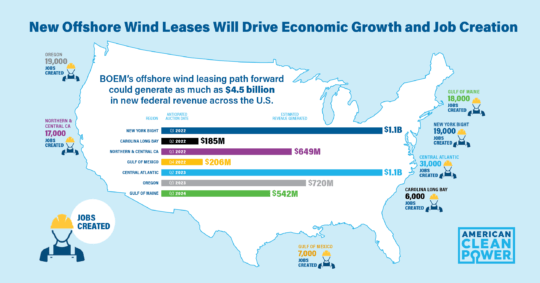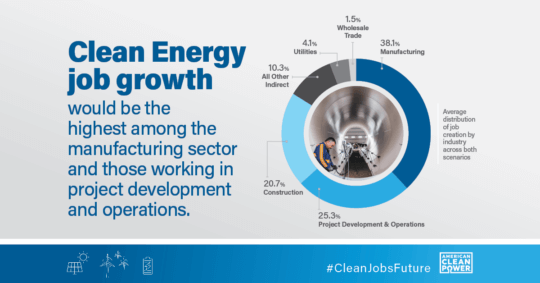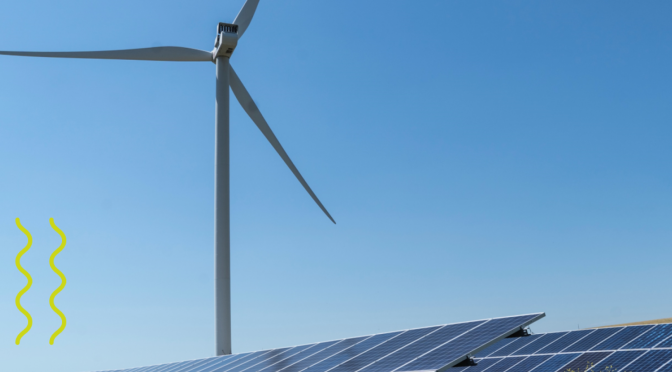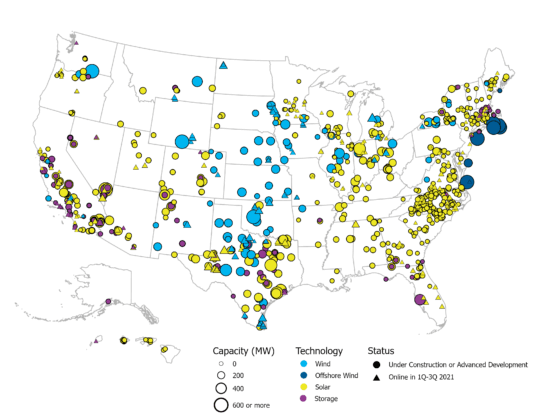Clean energy in America is having a record year. Look no further than the top headlines throughout this year. In 2021 alone, the United States re-asserted its place in the Paris Climate Agreement and established considerable national emissions reduction and clean energy goals. As 2021 comes to an end, ACP takes a look at the year’s top five trends in clean power.
1. Clean Power is Growing at a Record Rate
This year, the United States set an ambitious goal of powering the electric grid with 100% clean energy sources by 2035. Meeting this laudable goal will require significant increases in clean power installations, and the clean energy sector’s 2021 installs represent an important step in the right direction.
2021 has been a record year for clean power installations across wind, solar, and energy storage. In the U.S. over 7.2 gigawatts (GW) of new wind capacity has been installed through the third quarter of the year, enough to power nearly 2.2 million homes. Impressively, that is almost 1 GW more than total capacity installed through the third quarter of 2020, and nearly double the wind capacity installed during the same period in 2019. The growth in solar installations has been even more substantial. Through the third quarter of the year a record 7.8 GW of new solar capacity came online, a 2 GW increase from the first nine months of 2020, and a 235% increase from 2019. Newly installed solar capacity is enough to power over 1.5 million homes across the country. The buildout of these wind and solar projects has also seen significant increases in the energy storage sector. In the first three quarters of 2020, over 450 megawatts (MW) of storage capacity came online, a record at the time. In 2021, new storage capacity achieved a milestone, surpassing 2020 by almost 1 GW with 1.4 GW coming online through the third quarter of the year, a 211% increase.
Clean Power Projects Online in 2021 and in the Project Pipeline
With over 900 clean power projects currently under development across the country it is likely that we will continue to see record years for installations going forward. There is currently over 110 GW of clean power capacity in the pipeline. Solar has the most capacity in the pipeline with nearly 59.6 GW of capacity either in advanced development or under construction. Land-based wind has over 25.6 25.8 GW in the pipeline, storage has nearly 10.2 GW, and offshore wind has nearly 14.3 GW of capacity expected to come online over the next decade as of the end of the third quarter.
2. Corporate and Utility Customers Are Driving Growth
Commercial and utility customers alike continue to announce record amounts of power purchase agreements, driving growth in land-based wind, solar, and storage across the country. Through the third quarter of 2021, commercial and industrial customers have announced nearly 5.7 GW of clean power purchase agreements. Solar made up the majority of these corporate buys, with over 60% of power purchase announcements this year. This is a 10% increase from the first three quarters of 2020. Utility power offtakers have also announced nearly 7.5 GW of power purchase agreements through the first three quarters of the year. Power purchase agreements are helping companies and brands meet sustainability commitments and power businesses operations with 100% renewable energy sources. Because of the rapidly decreasing costs of wind and solar energy, PPAs have become an increasingly economic way for corporate purchasers to ensure long-term price certainty often at a price lower than the prevailing market rate.
3. Offshore Wind Potential Has Never Been Greater
2021 was an exciting year for offshore wind. This year was a record-breaking one for offshore wind procurement, with over 8.4 GW procured through state awards in New Jersey, New York, Maryland, and Massachusetts. To date, over 17.5 GW of offshore wind capacity has entered advanced development. Vineyard Wind, the first commercial-scale offshore wind farm to be granted federal approval in the United States, began onshore construction in 2021 and will begin putting steel in the water in 2022.
This year the Biden Administration announced an ambitious but achievable target of 30 GW of offshore wind by 2030, and the Bureau of Ocean Energy Management (BOEM) has taken significant steps toward advancing that goal. In October, BOEM released an Offshore Wind Leasing Path Forward 2021-2025 that outlines a plan to hold lease auctions in seven regions across the country. The first of these, to be held in the NY Bight, is expected in the first quarter of 2022. In December, ACP released an analysis that forecasts the federal revenue that BOEM could expect to accrue both from the sale of the area leases and the long-term rents and operating fees paid by projects developed in those areas, as well as the economic benefits and jobs that would be created as projects are built. The analysis found that over $4.5 billion in new federal revenue could be generated if BOEM’s roadmap is realized, which will support 128,000 jobs during construction and an additional 48,000 jobs in operations and maintenance roles.

With upcoming plans to also hold lease auctions in Carolina Long Bay, Northern and Central California, and the Gulf of Mexico next year, 2022 is shaping up to be another exciting year for offshore wind.
4. Creating a Next Generation Workforce
Clean energy is a job creation machine. Over 415,000 Americans across all 50 states now work in the sector, with wind turbine service technicians and solar installers ranked among top five fastest growing jobs in the country. Unions also have a strong presence in the clean energy workforce with unionization rates in the wind, solar, and battery storage fields that are higher than the national private sector average.
These trends are expected to continue. The total number of Americans employed by clean energy could grow to 1 million over the next decade. ACP’s Clean Energy Labor Supply Report found that reaching 50% to 70% clean energy by 2030 would create between 500,000 and 600,000 jobs during development and construction of new clean energy projects.

5. A Cleaner Environment
Clean power is a major force in the fight to combat climate change, and the transition to renewable energy sources like wind and solar is a key part of reducing greenhouse gases to reach our nation‘s emissions reduction goals. Today, over 11.5% of electricity generation in the U.S. comes from wind and solar. Wind generation supplies 8.9%, while solar generation supplies 2.7% of total generation. When combined with other technologies like hydroelectric power, the U.S. sources nearly 20% of its electricity from renewable energy sources.
In 2021, wind and solar generation prevented an estimated 380 million metric tons of carbon dioxide from being released into the atmosphere. That is equivalent to taking 82 million cars off the road. Wind and solar projects also prevented nearly 200,000 metric tons of nitrogen oxides and sulfur dioxide, two pollutants that are hazardous to human health, from being released. Decreasing these harmful pollutants helps to reduce smog and the rates of asthma attacks and other respiratory issues. Clean power projects in the pipeline could prevent an additional 195 million metric tons of carbon dioxide from being released each year, meaning the renewable energy industry will be doing even more to mitigate climate change and protect our health.
With continued industry momentum, supportive clean energy infrastructure and stable tax policies in place, clean power can expand on its 2021 record growth trajectory into the new year as one of the country’s leading energy sources. Additional policy work underway to invest in clean energy will deploy further projects, create more American jobs, and drive more economic benefits to communities across America as we all work toward accelerating our clean energy future.
Author:
Hana ColwellResearch & Analytics Manager [email protected]



